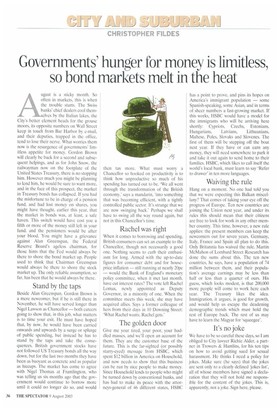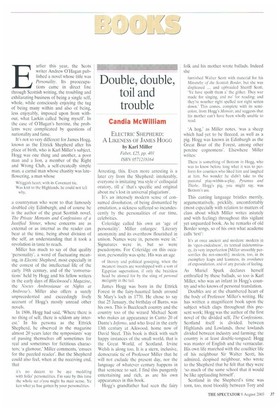Governments' hunger for money is limitless, so bond markets melt in the heat
Asugust is a sticky month. So often in markets, this is when the trouble starts. The Swiss banks' chief dealers cool themelves by the Italian lakes, the City's better element heads for the grouse moors, its opposite numbers on Wall Street keep in touch from Bar Harbor by e-mail, and their deputies, trapped in the office, tend to lose their nerve. What worries them now is the resurgence of governments' limitless appetite for money. Gordon Brown will clearly be back for a second and subsequent helpings, and as for John Snow, the railwayman now on the footplate of the United States Treasury, there is no stopping him. However much you might be planning to lend him, he would be sure to want more, and in the face of this prospect, the market in Treasury bonds has collapsed. If you had the misfortune to be in charge of a pension fund, and had lost money on shares, you might have thought, earlier this year, that the market in bonds was, at least, a safe haven. This switch would have cost you a fifth or more of the money still left in your fund, and the pensioners would be after your blood. You might have a grievance against Alan Greenspan, the Federal Reserve Board's ageless chairman, for those hints that the Fed would always be there to shore the bond market up. People used to think that Chairman Greenspan would always be there to shore the stock market up. The only reliable assumption, so far, has been that he would always be there.
Stand by the taps
Beside Alan Greenspan, Gordon Brown is a mere newcomer, but if he is still there in November, he will have served longer than Nigel Lawson as Chancellor — both careers going to show that, in this job, what matters is to time your exit. He must have hoped that, by now, he would have been carried onwards and upwards by a surge or splurge of public spending, but instead he has to stand by the taps and take the consequences. British government stocks have not followed US Treasury bonds all the way down, but for the last two months they have been as buoyant as concrete and as popular as hiccups. The market has come to agree with Nigel Thomas at Framlington, who was telling us six months ago that the government would continue to borrow more until it could no longer do so, and would then tax more. What must worry a Chancellor so hooked on productivity is to think how unproductive so much of his spending has turned out to be. 'We all went through the transformation of the British economy,' says a mandarin, 'into something that was becoming efficient, with a tightly controlled public sector. It's strange that we are now swinging back.' Perhaps we shall have to swing all the way round again, but not in this Chancellor's time.
Rachel was right
When it comes to borrowing and spending, British consumers can set an example to the Chancellor, though not necessarily a good one. Nothing seems to curb their enthusiasm for long. Armed with the up-to-date figures for consumer debt and for houseprice inflation — still running at nearly 20pc — would the Bank of England's monetary policy committee. when it met last month, have cut interest rates? The vote left Rachel Lomax, newly appointed as Deputy Governor, in a minority of one. When the committee meets this week, she may have acquired allies. Says a former colleague of hers from their days in 10 Downing Street: 'What Rachel wants. Rachel gets.'
The golden door
Give me your tired, your poor, your huddled masses, and we'll open an account for them. They are the customer base of the future. This is the far-sighted (or possibly starry-eyed) message from HSBC, which spent $12 billion in America on Household, and now needs to show that this business can be run by nice people to make money. Since Household lends to people who might be turned down by conventional banks, and has had to make its peace with the attorneys-general of 46 different states, HSBC has a point to prove, and pins its hopes on America's immigrant population — some Spanish-speaking, some Asian, and in terms of sheer numbers a fast-growing market. If this works, HSBC would have a model for the immigrants who will be arriving here shortly: Cypriots, Czechs, Estonians.
Hungarians, Latvians, Lithuanians, Maltese, Poles, Slovaks and Slovenes. The first of them will be stepping off the boat next year. If they have or can earn any money, they will need somewhere to park it and take it out again to send home to their families. HSBC, which likes to call itself the world's local bank, must learn to say 'Refer to drawer' in ten more languages.
Waiving the rule
Hang on a moment. No one had told you that we were expecting this Balkan miscellany? That comes of taking your eye off the progress of Europe. Ten new countries are joining the Union next year, and under its rules this should mean that their citizens are free to look for work in any other member country. This time, however, a new rule applies: the present members can keep the newcomers out for seven years. Germany, Italy, France and Spain all plan to do this. Only Britannia has waived the rule. Martin McMahon of Lombard Street Research has done the sums about this. The ten new countries, he says, have a population of 74 million between them, and their population's average earnings may be less than half or less than a quarter of ours. His guess, which looks modest, is that 200,000 more people will come to work here each year. The Treasury likes the idea. Immigration, it argues, is good for growth, and would help us escape the deadening demographic trends which must hold the rest of Europe back. The rest of us may have to learn the Magyar for 'squeegee'.
It's no joke
We have to be so careful these days, so I am obliged to City lawyer Richie Alder, a partner in Trowers & Hamlins, for his ten tips on how to avoid getting sued for sexual harassment. He thinks I need a policy for jokes. Make sure (he says) that the jokes are sent only to a clearly defined 'jokes list', all of whose members have signed a declaration that they will not hold me responsible for the content of the jokes. This is, apparently, not a joke. Sign here, please.
Eartier this year, the Scots writer Andrew O'Hagan published a novel whose title was Personality. Its preoccupations came in direct line through Scottish writing, the troubling and exhilarating business of being a single self, whole, while consciously enjoying the tug of being many within and also of being, less enjoyably, imposed upon from without, what Larkin called 'being myself'. In the case of O'Hagan's heroine, the problems were complicated by questions of nationality and fame.
It's not so very different for James Hogg, known as the Ettrick Shepherd after his place of birth, who is Karl Miller's subject. Hogg was one thing and another, a poor man and a lion, a member of the Right and Wrong Club, a self-createdly simple man, a carnal man whose chastity was lateflowering, a man whose
Whiggish heart, with its Covenant tie, Was knit to the Highlands, he could not tell why,
a countryman who went to that famously doubled city Edinburgh; and of course he is the author of the great Scottish novel, The Private Memoirs and Confessions of a Justified Sinner, whose concerns are as external or as internal as the reader can bear at the time, being about division of the self, an understanding that it took a revolution in taste to reach.
Miller has much to say of that quality 'personality', a word of fluctuating meaning, in Electric Shepherd, most especially in the context of the intellectual life of the early 19th century, and of the 'conversations' held by Hogg and his fellow writers in the early days of Blackwood's Magazine, the Nocres Ambrosianae or Nights at Ambrose's, Miller also offers a surely unprecedented and exceedingly lively account of Hogg's mostly unread other novels.
In 1806, Hogg had said, 'Where there is no thing of self, there is seldom any interest.' In his persona as the Ettrick Shepherd, he observed in the magazine almost 20 years later the symposiasts' way of passing themselves off sometimes for real and sometimes for fictitious characters; 'a glamour,' Miller comments, 'ensues for the puzzled reader'. But the Shepherd could also feel, when at the receiving end, that
it's no decent to be aye meddling with folks' personalities. I'm sure by this time the whole set o'you might ha mair sense. Ye ken what ye hae gotten by your personalities.



































































 Previous page
Previous page